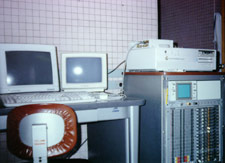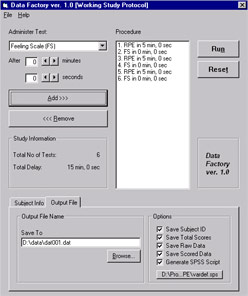The Department of Kinesiology and Community Health
College of Applied Health Sciences
Side Navigation
Facilities

The Exercise Psychophysiology Laboratory (ExPPL) is located in Room 357 of Louise Freer Hall. Primarily, the laboratory has a research focus, serving the needs of its staff, as well as other graduate and undergraduate students conducting research in the area of Exercise Psychophysiology as part of their graduate training in Exercise Psychology, undergraduate honors theses, supervised research experience courses, or independent study courses. In addition to its research role, the ExPPL can be used for educational purposes. For example, the ExPPL has been used to provide hands-on experience to students enrolled in KINES 443/PSYCH 443: Psychophysiology in Exercise and Sport, a course offered by the Department of Kinesiology & Community Health each Spring term.
The ExPPL is equipped with an array of instruments for the assessment of psychophysiological variables. For our EEG research, we currently use a Grass Model 12 Series Neurodata Acquisition System with 16 model 12A5 amplifiers. For the collection of the EEG signals from the scalp we use stretchable lycra electrode caps, identical to the one shown above on the cover of "Newsweek." This EEG setup is used in conjunction with the EEGSYS software package for storing and analyzing the digitized EEG signals. For the study of facial EMG responses, we use a Coulbourn module frame fitted with 2 bioamplifiers and 2 contour following integrators. Furthermore, the laboratory is equipped with Polar heart monitors, other instruments for the automated measurement of blood pressure and heart rate, as well as numerous accessory instruments.

The ExPPL houses numerous computers, providing ample computing power. All of the computers are inter-connected through the Department of Kinesiology & Community Health Local Area Network (LAN), and are also connected to the Internet via fast Ethernet links. Two of the computers are equipped with dual monitors for the simultaneous representation of psychophysiological data in graphic and textual form. Also, two of the computers are equipped with A/D boards and are used primarily for the collection of psychophysiological data. The remaining computers are mainly used for data storage and analysis, as well as for the collection of self-report data. Data are stored using a variety of media, including multi-Gigabyte hard disks and writeable CD-ROM drives.
For our exercise interventions, we primarily use a Quinton ClubTrack Treadmill. When necessary (e.g., to reduce movement artifact in psychophysiological measurements taken during acute exercise), we use Monark cycle ergometers. For the assessment of the aerobic fitness of our study participants, we have access to the human biodynamics research area in the Physical Fitness Research Laboratory (PFRL). The PFRL is equipped with state-of-the-art instruments for the on-line measurement of expired gases during exercise, as well as an impressive array of other measurement and recording devices.
For the assessment of self-reported affective responses, we have developed "Data Factory", a software program which automates the data collection process. The experimenter can specify the study protocol (the psychometric scales and questionnaires to be administered and the time intervals between administrations), and study participants respond using a UniTouch touch-screen monitor by Carroll Touch. "Data Factory" collects the responses, scores the questionnaires automatically, and saves the data in a format which can be read directly by statistical analysis software. In addition to "Data Factory", we have developed a number of custom-made computer programs which automate and streamline the processing and analysis of psychophysiological data. For example, we have developed programs which parse and convert the output files generated by the EEGSYS spectral and coherence analysis modules into ready-to-analyze format, thus eliminating the need for manual data entry.
For further information regarding our research, as well as graduate and undergraduate study and research opportunities in Exercise Psychophysiology, please contact Dr Steven J. Petruzzello.
